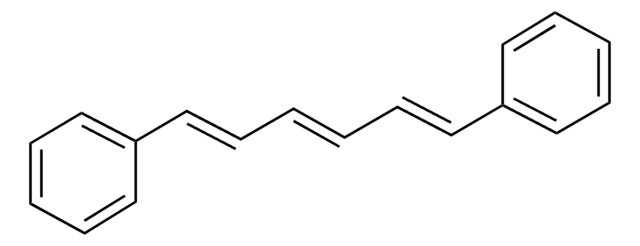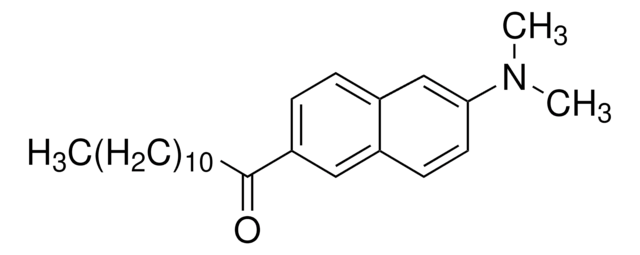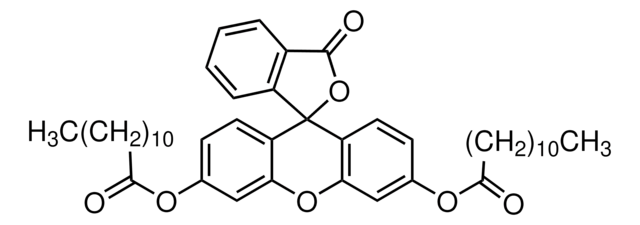43060
N,N,N-Trimethyl-4-(6-phenyl-1,3,5-hexatrien-1-yl)phenylammonium p-toluenesulfonate
BioReagent, suitable for fluorescence, ≥96.0% (TLC)
Synonym(s):
1,6-Diphenyl-1,3,5-hexatriene-4′-trimethylammonium tosylate, 1-(4-Trimethylammoniophenyl)-6-phenyl-1,3,5-hexatriene p-toluenesulfonate, 4′-(Trimethylammonio)diphenylhexatriene p-toluenesulfonate, TMA-DPH
About This Item
Recommended Products
product line
BioReagent
Quality Level
Assay
≥96.0% (TLC)
form
powder
mp
237 °C (dec.) (lit.)
solubility
DMF: soluble
DMSO: soluble
methanol: soluble
fluorescence
λex 355 nm; λem ~430 nm in methanol
λex 355 nm; λem ~430 nm in methanol
suitability
suitable for fluorescence
SMILES string
Cc1ccc(cc1)S([O-])(=O)=O.C[N+](C)(C)c2ccc(\C=C\C=C\C=C\c3ccccc3)cc2
InChI
1S/C21H24N.C7H8O3S/c1-22(2,3)21-17-15-20(16-18-21)14-8-5-4-7-11-19-12-9-6-10-13-19;1-6-2-4-7(5-3-6)11(8,9)10/h4-18H,1-3H3;2-5H,1H3,(H,8,9,10)/q+1;/p-1/b5-4+,11-7+,14-8+;
InChI key
ZKARERKEBVSZCX-VMDDUYISSA-M
Looking for similar products? Visit Product Comparison Guide
Application
Other Notes
Not finding the right product?
Try our Product Selector Tool.
Storage Class Code
11 - Combustible Solids
WGK
WGK 3
Flash Point(F)
Not applicable
Flash Point(C)
Not applicable
Personal Protective Equipment
Regulatory Listings
Regulatory Listings are mainly provided for chemical products. Only limited information can be provided here for non-chemical products. No entry means none of the components are listed. It is the user’s obligation to ensure the safe and legal use of the product.
JAN Code
43060-VAR-F:
43060-100MG-F:
43060-BULK-F:
43060-25MG-F:
Choose from one of the most recent versions:
Already Own This Product?
Find documentation for the products that you have recently purchased in the Document Library.
Our team of scientists has experience in all areas of research including Life Science, Material Science, Chemical Synthesis, Chromatography, Analytical and many others.
Contact Technical Service







